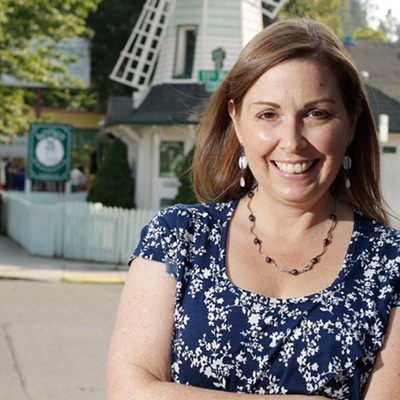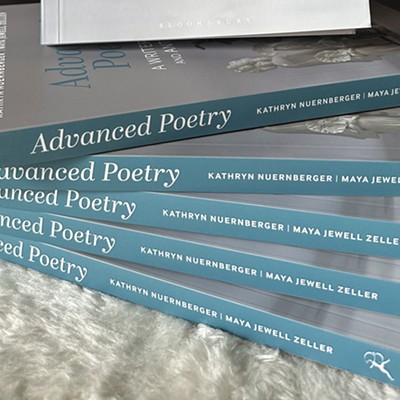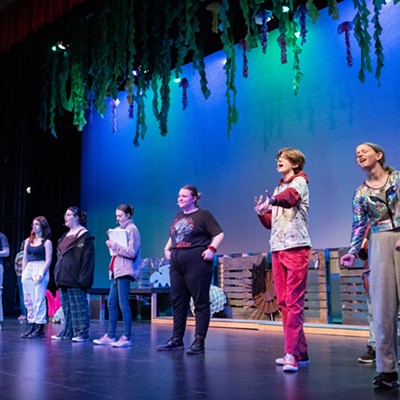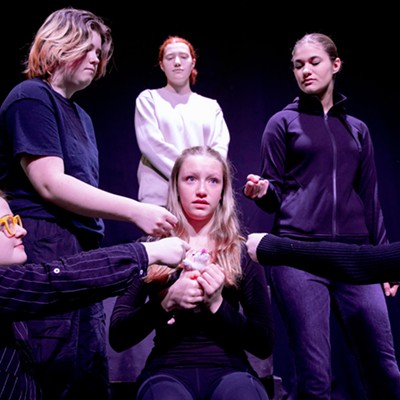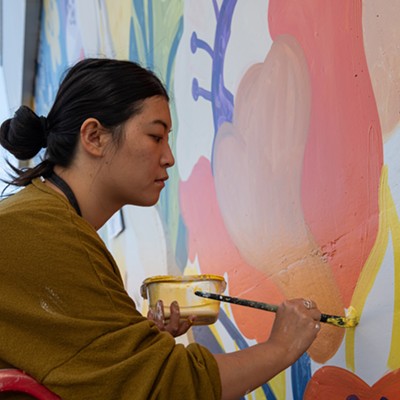By a quarter to 7 pm, it’s hard to get in the door. People slump in booths and perch atop stools. Bodies block the soda fountain and lean against the ordering counter. People hoot, snap, shout titles.
At the front, only slightly less skinny than the microphone stand he clutches, Mark Anderson commands the room. With a smirk, he bows his head and shakes it gently, as though the Holy Ghost is upon him. He gestures with his hands. Settle down. People more or less comply.
“This place,” he says, voice rising, “is a place of hugs, everyone.” Sound rushes back in. They’re screaming now. “Take off your shirt!” Neato Burrito is the scene of many rowdy, sweaty, drunken nights. Tonight, though, the downtown Spokane bar and burrito shop serves more soft drinks than beer.
“I want your babies, Mark!” one patron yells. “He wants my babies,” Anderson relays, matter-of-factly, back to the audience.
“We all want your babies,” shouts someone else. The smirk grows into a smile. “Welcome to Broken Mic,” Anderson says, “home of the Truth Bomb.”
At 23, Anderson — who grew up in the farmland near Freeman and was, in his words, “the most awkward little kid” — is the leader of a movement.
He didn’t start Spokane’s spoken-word scene, but the people here have come to think of him as its savior, steering it, in the last year and a half, through two separate relocations and a merger with a second reading series.
Step inside a Broken Mic night at Neato Burrito
In six weeks at Neato Burrito, crowds have grown from 20 to 40 to what now regularly tops 60.
Allen Duffy, a comic artist and writer, came out of curiosity and found community. “It’s a lot of beautiful, young, attractive artists who are really interested in being around each other,” he says, “Mark really provides that environment.”
Four years ago, no one would have seen this coming. In September of 2006, at Empyrean Coffee House, a poet named Daniel Harrington started hosting monthly slam poetry competitions. Among the poets who competed was Chrisy Riddle, a creative writing teacher at Central Valley High School.
Empyrean closed within three months. When Riddle bought and reopened the coffee shop and club with her sister, Michelle, in early 2007, she did so largely because she wanted to keep the community Harrington had started alive. Empyrean began to host spoken-word open mics before slam events, Riddle says, “for people who wanted to read poetry, but not that style of poetry.” Those free-form opening events soon became standalone readings for anything-goes writing, forming the framework for what eventually become known as Broken Mic.
In mid-2007, Anderson started showing up. His impact was immediate.
“Michelle and I wanted to shoot him with a BB gun or something,” Riddle says. Anderson would take the stage, reading just awful stuff.
“I could barely speak English,” Anderson says. Worse, though, was Anderson’s boundless enthusiasm. He’d take the stage “over and over,” Riddle says. “We couldn’t take it.”
His artistic breakthrough finally came in summer of 2008. He left Spokane and went to stay with a friend in Portland, busking with his saxophone at public markets for coffee money. He set writing aside, only finishing one poem the entire summer.
“I let it come to me,” Anderson says. The result was “We All Have Our Ghosts,” his first poem as a mature writer. “I still read that and I still feel OK reading that, if that makes sense,” he says.
Anderson returned to Spokane and grew along with the scene, becoming a member of Spokane’s first National Poetry Slam team and taking a leadership role in the organization of the events. In early 2009, he took organizational duties over completely.
Riddle says Anderson’s transformation has been incredible. “I feel like he bleeds poetry,” Riddle says. “He can always silence a room.”
Watch Mark Anderson read his poem, "For Connor"
Mark Anderson’s best poem is “For Connor,” a piece about eavesdropping on a conversation between a mother and her friend about her daughter’s troubled boyfriend. It speaks of loss and the need for connection. The way Anderson connects, though, is key to understanding why poetry is perhaps the perfect form for him.
He says he only really understands himself after emptying himself out from the inside, picking through the viscera, and rebuilding himself.
“I get inarticulate when trying to talk about abstract things,” he says, and there’s nothing quite as abstract as a being’s quest to find itself in words.
For his part, Anderson ensures Broken Mic is an accepting environment. Even beginning poets reading outright bad work get enthusiastic praise — this is a rule of his. As writers progress, though, and if they want it, Anderson begins offering criticism.
Tim Johnson, now 19, started reading in high school as a way to get out of the drudgery of his rural Loon Lake upbringing, but he says it wasn’t until he started to ask Anderson for feedback, that he began to improve.
Johnson says Anderson told him something akin to what Bob Dylan told the Beatles after they released Hard Day’s Night: “Everything you do is really catchy, but there’s no meaning.”
“I rely on Mark to be so honest,” Johnson says, “that his criticism will tear me apart.”
Since graduating from EWU (psychology, “which I’ll probably never use”), Anderson has devoted himself wholly to poetry, and to this scene. He has no other job than this, and this doesn’t, at present, pay. He lives with his parents in a rancher off Regal, on the upper South Hill. His car is a crappy 1985 Chevy Citation that is all but undriveable, so he bums rides everywhere.
Anderson is fond of saying that the poets of ancient Persia were either worshipped or killed. It’s his way of underscoring how low the stakes are now. “We must find a way to write with the feeling of significance,” he says.
He has a poem about how poets were once paid their weight in gold. Now it’s, “We’ll give you your weight in air / don’t breathe it up too quick.”
But look closely while Anderson is performing a poem, and you’ll see the air’s been sucked out of the room. People stand, and sit, and lean, rapt.
Then look at the others reading. Tyler Evans, an MFA candidate in EWU’s creative writing program, reads a piece of flash fiction about the practical problems surrounding the end of civilization. Allen Duffy, 21, reads “The Nine Commandments I Know,” a profanity-riddled half-rap written through the mouth of John Proctor, the everyman adulterer-farmer from Arthur Miller’s The Crucible.
Ryan Weech, 19, reads a densely assonant, rhythmic poem about trading the shrill pitch of television for the warmth of vinyl. “Thick paper cutout pupils / follow her sexy aesthetic,” she recites, swaying, “meteor and morning glory / lysergic, lovely, kinetic.”
Like the vast majority of those in attendance, Weech is out of high school and able to go anywhere. But she’s not, partially because of the work it takes to create something as compelling as Broken Mic.
“It’s a lot harder to get things going here [than other places],” she says, and hard to keep people enthusiastic. In scenes like Seattle, building community isn’t as essential, she believes, because there’s an endless supply of excited young people. Creating something this cool here, she says, “ends up being more thrilling and exciting.”
Anderson is right: This poetry isn’t about riches or death. But ours is a town that routinely loses its brightest young minds to grander cities with healthier scenes. That makes the stakes pretty high.
“We must find ways to make our words actually matter,” Anderson says, perhaps not realizing the blueprint he’s already created with Broken Mic.
Building community is the first way. Leading that community by example, the second.
Broken Mic • Wednesdays, 6:30 pm • Free • Neato Burrito • 827 W. First Ave • 847-1234 Lantern-Lit: Writing, Music, and Art Collide • Sunday, March 27, 8:30 pm • $7 • The Magic Lantern • 25 W. Main Ave. • 209-2383




